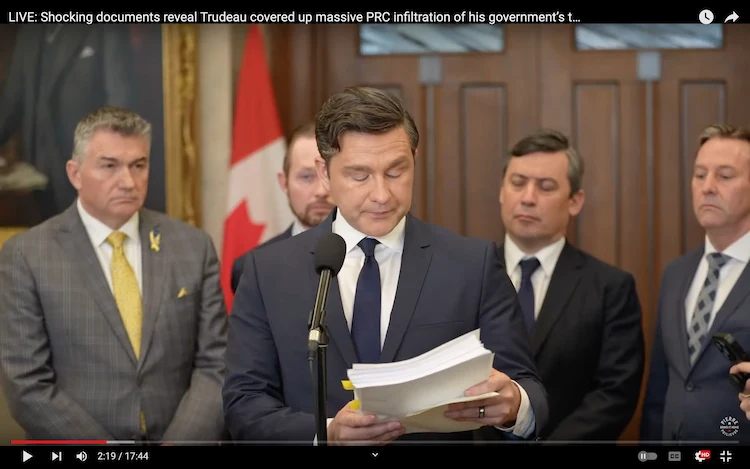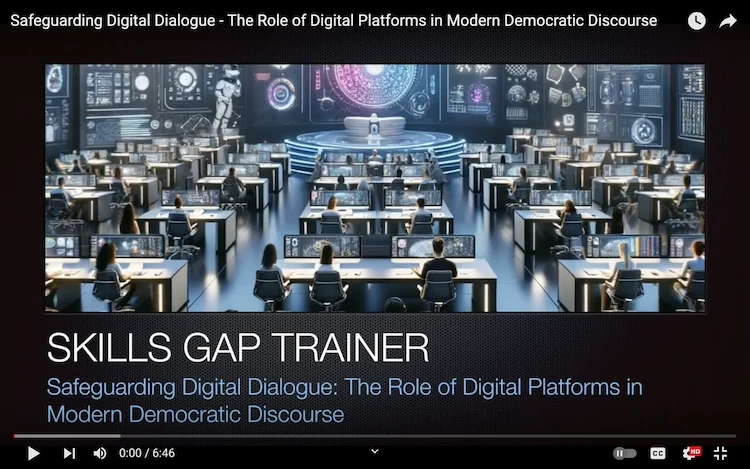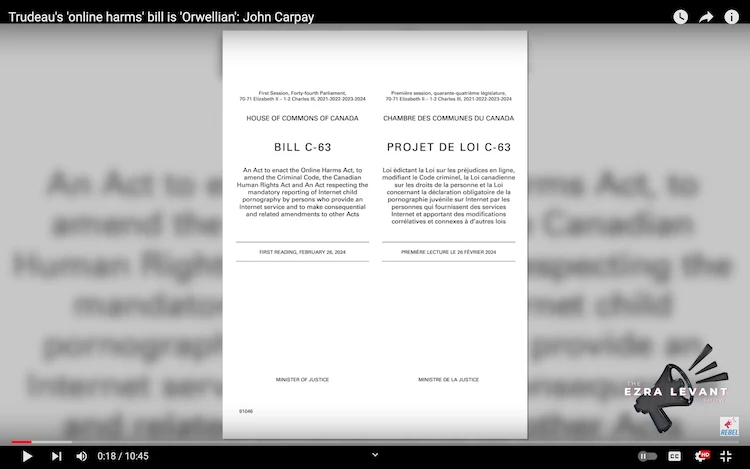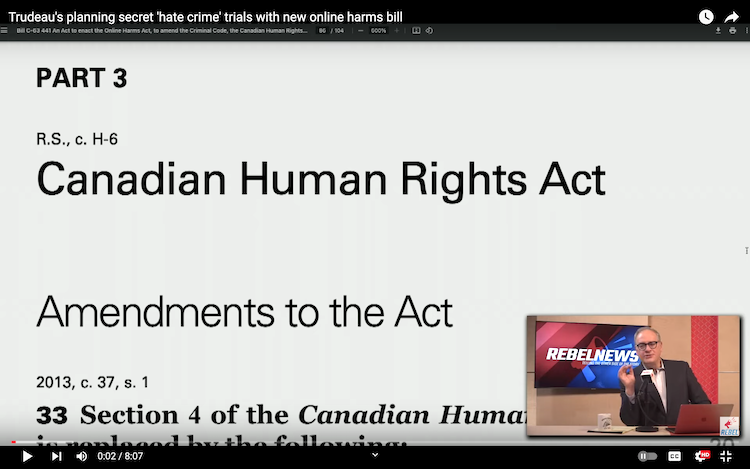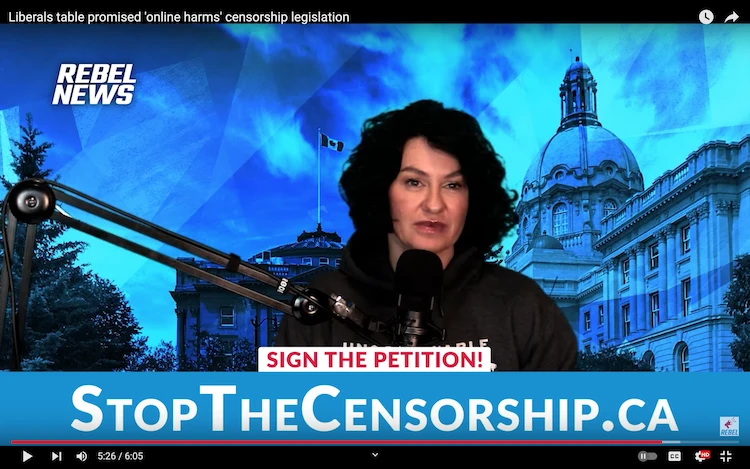LIVE: Shocking documents reveal Trudeau covered up massive PRC infiltration of his government’s..
Link: https://www.youtube.com/live/pc4M946CiZI?si=3N3If-4AdOyzCxJQ
Video Title: Safeguarding Digital Dialogue – The Role of Digital Platforms in Modern Democratic Discourse
Link: https://youtu.be/ls5HK2H124A?si=ehAXFXeZnVZ0POTY
@skillsgaptrainer “Didn’t the Liberal Party MPs assert their understanding of technology to the public? Indeed, a tremendous wave of technological innovation is sweeping across the globe, with a myriad of disruptive technologies rapidly accelerating and converging. This convergence is leading to a unique point in time where all these innovations will simultaneously provide new capabilities to humanity, creating a technological singularity akin to that anticipated with artificial intelligence. This acceleration in technological development is matched by an increasing pace in media creation from global and emerging countries, enriching and livening the now global, technological, business, and informational ecosystems. We are in the era of AI, marked by the invention and innovation propelled by humans and increasingly by AI itself. In this new age, there is a notable divergence between the efficiency of AI-driven economies and governmental operational efficiency which is not AI based, and not technology driven. This gap may widen significantly soon, and increasingly so, with governments potentially unable to manage the complexities of rapidly evolving societies and rapidly complexifying societies, especially as governmental growth might only be linear and hampered by economic, global sovereign debt wave limitations, demographic limitations, efficiency constraints, energy policy and other constraints. Governments that restrict themselves to using predominantly 20th-century frameworks, such as the parliamentary system, may find themselves ill-equipped to handle a highly agile, highly dynamic, highly threatening, and highly energetic, operational environments, equivalent to the combat command operations in the most intense wars. These legacy administrative governance frameworks were designed for slow agrarian and barely industrial societies, not designed for the post-computing age, let alone the era of Industry 4.0 technology emergence and AI/AGI. Without integrating emerging technologies, governmental systems may fail to keep pace with the exponential growth of complex societal needs, raising the risk of systemic collapse. see book : “The Collapse of Complex Societies”. The Government of Canada, for example, has opted to employ AI-augmented and monitored digital platforms like Facebook, Twitter/X, Instagram, and YouTube. These platforms not only serve the public but also act as tools for digital transformation and modernization within the government itself, for free, allowing employees to use these networks for official tasks effectively. This seamless integration has facilitated an exponential rise in operational efficiency without necessitating complex internal reforms, and has helped advance the speed of operations at Government of Canada to be in perfect sync with public sentiment and the exponential rise in the number of simultaneous threats, dangers, risks, challenges and dangers. Through these platforms, Canadian government professionals can efficiently harness ‘crowd intelligence’—gathering, organizing, and processing public feedback, ideas, and concerns. This system enhances transparency and ensures that accurate information reaches the appropriate public representatives efficiently. It resembles working on a “Google Cloud Document,” at a high tech corporation like Google, where multiple contributors, possibly SGT and Google AI teams one day, can collaborate efficiently, now applied to governmental operations, enabling public engagement, swift resolution of concerns, and timely policy updates. Furthermore, the transparency afforded by social media allows for a broader development of ideas, enhancing democratic engagement. However, the innovative prowess and the scientific advancements facilitated by these amazing social media tech platforms are under threat. Prime Minister Trudeau’s implementation of strict censorship laws, online hams laws or hate speech laws, imposing severe penalties, risks stifling ‘free speech’, ‘freedom of thought’ (or posts), and hampering the digital platforms’ role in “bridging the gap” between citizens and their representatives. This not only limits public discourse but also hinders the digital governance transformation, crucial for navigating the complexities of modern society and technology. In this role, SGT has taken the initiative to help demonstrate how citizens can not only ‘bridge the skills gap’ but also ‘bridge the gap’ between ‘citizen needs and local data’, to the Government Of Canada’s ‘advanced reasoning analysts’ and ‘decision-making MPs’, and similar ‘professional representatives’. The current approach, as developed by digital giants, serves as an effective management solution for governmental operations, not just fo public entertainment, education and business use. It creates an agile, energetic, and challenging environment necessary for modern governance, allowing for precise and informed decision-making. By leveraging the ‘collective intelligence of Canada in it’s entirety’ and the ‘analytical power of AI’, the government can enhance its decision-making processes, aiming to build a stronger nation equipped with advanced reasoning capabilities, at 0$ cost. Yet, Trudeau’s policies pertaining to censorship and online hams legislation, and the associated punishments designed to stop free speech over these digital networks with government officials, risk impairing Canada’s ability to adapt to the fast-paced digital era, hindering the nation’s capacity to manage volatile information landscapes and emergent 5th generation conflicts, as well as preventing the agile and dynamic modernization of the Government necessary to deal with the vast set of problems set to materialized in the world from 2020 to 2050, known as the “Great Filter”, which is described on our web platform. Without the support of digital networks, the government risks being overwhelmed by the increasing complexity and myriad challenges of the 21st century, from climate change to technological disruptions. These networks, vital for a digitally enhanced society, enable Canada to navigate and manage the complexities of an increasingly intricate world. Without them, the government risks leading the country towards systemic failure, holding onto outdated management methods that are no longer viable in today’s complex and rapidly evolving landscape.”
Trudeau’s ‘online harms’ bill is ‘Orwellian’: John Carpay
Link: https://youtu.be/1ClQNeBQiUw?si=uHO0dJjoVcsuSdkl
@Razear “Imagine being thrown in prison for stating biological facts. Telling the truth as a punishable crime… wow.” @skillsgaptrainer @Razear “Don’t worry Canadian free speech scientists! Perhaps the plan is for the best Canadian change-makers, for all of Canada’s best scientists, who fight to bring equality, rights, logic and structured thinking and free speech to Canada, they will get to live a life in prison like Nelson Mandela! But look at the bight side, one day people might be out of prison, and they can all become presidents of Canada then! Real presidents, not like the PM! Hint, this is called love not hate speech. Don’t do a switcharoo on people here.” 🤣
Video: Trudeau’s planning secret ‘hate crime’ trials with new online harms bill
Link: https://youtu.be/SY1pdvAkWRA?si=klbRgFXhyvYOuY3Y
@skillsgaptrainer “Having a Canadian identity includes a little admiration of the quality of good speech, professional speech and free speech. It comes down a little from the British Empire values, European values and former American values as well, the educational history and legal history, from the initial immigration to Canada of European origin. This free speech enlightenment idea has deep roots in European history. So why wouldn’t the PM have European, American or Canadian values or identity? Then where in the world does this anti free speech identity or censorship identity come from?”
@skillsgaptrainer “Thanks for the heads up Rebel News about the trials. Every day is a new surprise. The surprises seem to be compartmentalize, so gradually released on a daily basis, so we can digest the changes one day at a time. Some related concepts, notes and terms that might be relevant and useful here for any future victims of this legislation.
1/ Never knew that Liberal legislators were so proficient, professional & tech savvy at forecasting crime with technology, that they are already releasing digital crime prediction legislation, before even thought crime prediction AI techniques have even been invented! 😎
2/ Thought crime analysis & crime prediction! This is ambitious, like the film Minority Report! Amazing how Liberal legislators are ahead of Apple, NVIDIA, OpenAI, Microsoft & Google in predicting future! Wow! Engineers have not even had a chance to study intro deep learning AI. 😇
3/ Impressed with crime prediction algorithm!
3.1/ Agitate public with unethical laws.
3.2/ Ethically minded Canadians forced to ‘morality’ with hate posts online to Liberal Party. 3.3/ Once anger at immoral laws is posted, use posts as proof of crime potential.
3.4/ Lockup/fine leaders.
4/ If accused of online hate speech by political party, from ethical perspective, person might not necessarily have violated ethical principles due to; Utilitarian Principle, Deontological Principle, Virtue Ethics Principle, Care Ethics Principle & Rights-Based Ethics Principle.
5/ Utilitarian Principle: If a person’s online expression was harsh/critical, but was intended to bring attention to policy or action that could cause widespread harm, or attempt to increase public good, actions can be ethical and align with principle.
6/ Deontological Principle: If individual’s online posts adhered to truth & were motivated by duty to justice or transparency, they might not breach deontological principles. The key is whether they believed they were fulfilling moral duty, even if words misconstrued as hate.
7/ Virtue Ethics Principle: If person’s posts were driven by commitment to virtues, aiming to correct a wrong or uphold moral standards, actions could be justified under virtue ethics. Key is whether individual aimed for virtuous qualities through posts, rather than to spread hate.
8/ Care Ethics Principle: Care ethics would justify individual’s actions if they were expressing concern or compassion for others’ well-being or attempting to protect vulnerable groups from harmful policies or actions, rather than an intent to harm or degrade, post might be ethical.
9/ Rights-Based Ethics Principle: If person was advocating against a policy or action that they believed infringed on people’s rights, their post, although perceived as harsh, could be ethically justified. Key is whether the fundamental intention was to defend fundamental rights.
10/ Ethically, it’s problematic to have Liberal Party punish someone for intentions or thoughts without actual criminal actions, as it undermines the principle of “presumption of innocence” and the right to “freedom of thought”.
11/ Presumption of Innocence: Fundamental principle of legal systems around world. Person is considered innocent until proven guilty. Punishing based on intentions or thoughts alone, without concrete actions, directly contradicts principle, assuming guilt without commission of crime.
12/ Right to Freedom of Thought: Universal Declaration of Human Rights (Article 18). Everyone has right to freedom of thought, conscience & religion. Penalizing for thoughts or intended actions infringes on basic human right, limiting ability to think free without fear of punishment.”
Video: Danielle Smith DEMOLISHES Trudeau with epic MIC DROP
Link: https://youtu.be/UIX25p98Ik4?si=T1_jQsVru1VLItyQ
@skillsgaptrainer “What kind of language do they use now, combined climate change family sentence? Are we doing a climate change solution or is it a solution for families? What nuclear reactors were built with this carbon tax? Or is the tax for non climate change. This doesn’t seem legitimate.”
Video: Liberals table promised ‘online harms’ censorship legislation
Link: https://youtu.be/0SNPmSG-hJ8?si=WNHfMCVb5kLRkZc6 SIGN THE PETITION!
STOPTHECENSORSHIP.CA Link: https://www.rebelnews.com/tags/stop_the_censorship
@skillsgaptrainer
“Q1) Could the delay in Canadian elections be tied to upcoming Hate Speech legislation & war? Can Canadians express opposition & even hate to government, if government sends family member or friend to die in Ukraine, without fearing severe 20000 fine or life imprisonment?
Q2) Could the delay of election vs Conservatives have occurred simply to pass laws like Hate Speech law, where it would be possible to suppress dissent during war, especially among those hating the government decisions on war over the life of their family members or friends?
Q3) Are recent censorship, journalism & hate speech laws about controlling & silencing public dissent during war? The Conservative MP would be capable partners of military in a tough situation such as war. If provided option, public would elect Conservatives for defense.
Q4) PM & Liberal Party do not have moral authority or trust of even 22% of public, so how can Canada justify to pass Hate Speech or similar laws, especially in time of war, given that is clear knowledge universally that Pierre Poilievre & Conservative MP have this authority & trust.”
LIVE: The $60 million #ArriveScam coverup
Link: https://www.youtube.com/live/DET3gW1M9cg?si=cEDGJI0j9UVpLyAj
@skillsgaptrainer “A few midnight thoughts relating to upcoming hate speech legislation in Canada:
1/ Hate grows from fear, misdirected pain or response to injustice. We can scapegoat, seek belonging in hate groups, or generalize from negative experiences that everyone is hateful. Even competition for resources/rivalry can fuel hate. People hate when leaders breach boundaries of citizens.
2/ Online anger is often a distorted response to problems the government itself creates: fuelling division, failing to address inequality, failing to stop borrowing money, failing to build houses, failing to recruit skilled doctors, failing to manage immigration levels…the list goes on.
3/ Instead of policing speech, focus should be on government’s own actions that breed hate. Hate speech laws are actually designed to crush citizens that know how to design better quality government, creating a climate of fear does nothing to fix the real issues of bad government.
4/ The Liberal Party creates hate speech laws they claim will curb online hatred. But internet has mechanisms of accountability. People talk nice to avoid having messages disappear, reported on or flagged, avoid losing reputation or avoid getting their business traffic throttled to 0.
5/ The internet lacks the personal context for most online “hate” to cause true harm. In effect, the Liberal Party seeks to legislate a non-existent problem. The real target of such laws is criticism of the government, disguised as protecting communities.
6/ Those targeted by hate speech laws are intellectuals often who lash out at the powerful in frustration over poor policy & bad actions. Throughout history, it’s intellectual dissenters who are punished, not those who truly hold power & create the hate-filled environment.”
Related books and resources:
“Twitter and Tear Gas: The Power and Fragility of Networked Protest” by Zeynep Tufekci explores the dual nature of social media as a tool for democratic engagement and its limitations due to authoritarian control, directly connecting to your discussion on digital platforms’ role in democratic discourse.
“Automating Inequality: How High-Tech Tools Profile, Police, and Punish the Poor” by Virginia Eubanks discusses how digital tools initially meant to aid democracy can end up marginalizing communities, offering a critical view on the misuse of technology in governance that complement our points on digital governance.
“Speech Police: The Global Struggle to Govern the Internet” by David Kaye delves into the complex landscape of online content regulation by platform companies and governments, shedding light on our concerns regarding censorship and digital dialogue.
“Digital Technology and Democratic Theory” edited by Lucy Bernholz, Hélène Landemore, and Rob Reich, provides a comprehensive examination of how digital technologies intersect with democratic practices and theories, fitting well with our article’s exploration of digital platforms in democratic discourse.
“Digital Democracy: Issues of Theory and Practice” by Kenneth L. Hacker and Jan van Dijk provides an in-depth look at the emergence and impact of computer-mediated communication systems on political communication, which can give further insights into our discussions on digital democracy.
To see our Donate Page, click https://skillsgaptrainer.com/donate
To see our YouTube Channel, click https://www.youtube.com/@skillsgaptrainer
